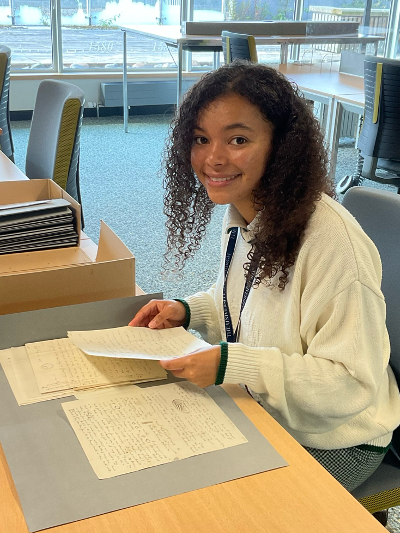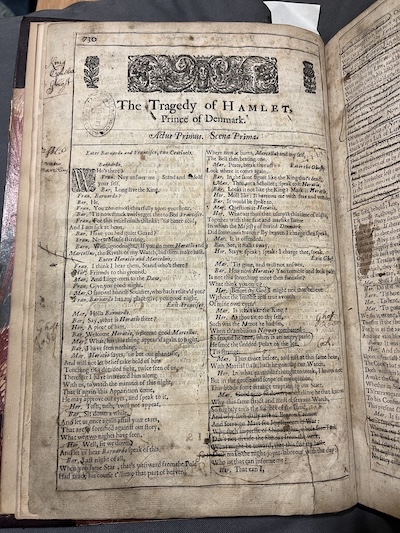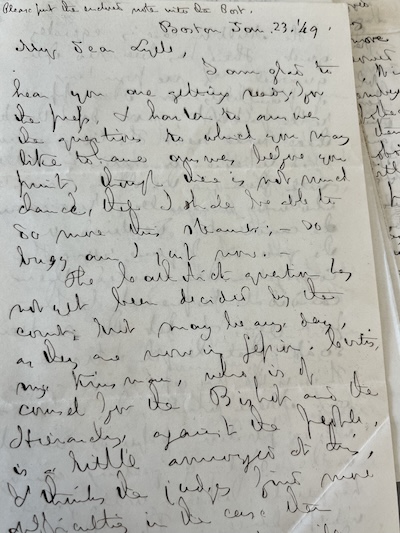Andrea Edwards: UW in Scotland
Published December 12, 2024
Andrea is a junior at the University of Wyoming, pursuing a dual degree in History and in Environment and Natural Resources, with a minor in Museum Studies. She plans to graduate in Spring 2026 and aims to pursue a PhD or master's in Information Science to work in archives. Andrea recently participated in an internship in Scotland, through the Center for Global Studies UW in Scotland program, to build professional connections for her future graduate studies abroad. She sat with Greg Ronco, Assistant Director of the Center for Global Studies, to share her experience.

Greg: What interested you about the internship?
Andrea: I've always loved Scotland. Do you know the TV show Outlander? I'm a massive fan. I started watching it during the pandemic and got really into it. And I was like, I need to go to Scotland at some point. Then I got the email about the Scotland internship from the history department mailing list and thought I might as well apply. And then I got it, which was surprising. So, I was like, I guess I'll go do this.
Greg: What else interested you about Scotland?
Andrea: Outlander has had quite an impact both financially and culturally because it's given so much more attention to that part of Scottish history, especially for people outside of Scotland. When I went to Culloden, it had gotten so bad with the Fraser stone there that they had to cordon it off because of how many people that would visit and touch it. So Outlander was a part of this, but I do have other reasons. I have Scottish heritage. My grandma's grandma immigrated from Scotland to the United States in the 20s, and I've been learning more about my family history. Also, for my particular research area, I'm really interested in medical botany, which is using plants for medicinal purposes. Scotland was the center of that in the 18th century, which is also my research period. Scotland is just perfect for me in so many different ways.
I also got big on Scotland specifically because I read American Eden by Victoria Johnson. It's a David Hosack biography. He was really into medical botany in that period, especially in expanding it in America because so many of the medicinal plants in the Americas had not been completely documented or hadn't been investigated. I read it and was like, why is no one talking about it? It's so important because a lot of our medicines today are derived from natural sources or an iteration of a natural source. I feel like people forget about that. No one looks at aspirin and thinks that it comes from a tree.
Greg: And what was useful about Scotland, in terms of your area of study?
Andrea: It's where the archives are. That's the main thing, because the University of Edinburgh, as well as the Royal College of Physicians, have really great archives that go back hundreds of years. A lot of the people who pioneered medical botany, like John Hope and some other important scholars, all their papers are there. Some of them are available online, but a lot of the depth of it in the catalog is not that great. So, you don't know exactly what you're looking at online. It's really great to actually go there and touch the physical papers.
Greg: I get that. Did you have any archive experience before this internship?
Andrea: I did a yearlong internship at the Wyoming State Archives my senior year of high school, and then I've also been working at the American Heritage Center.
Greg: How was the archive experience for you at University of Edinburgh? Where did you work?
Andrea: The main spot that I worked at was the Heritage Collections at the University of Edinburgh. That was where I spent the bulk of my time. And then also I did visits to the Royal Botanic Gardens Edinburgh and worked in their archives there as well as at the Royal College of Physicians. In terms of archives, most of them are just in Edinburgh. I didn't get to really look at any of the ones outside of that city, unfortunately. My supervisor was Pamela McIntyre. She was the strategic projects archivist in the Heritage Collections. I also worked with her boss, Christine Megowan, during all of that. Really cool people.

Lorem ipsum dolor sit amet consectetur. Sapien massa nisl mauris dui ultricies adipiscing sed a nam. Accumsan sed.
Greg: Did you enjoy the work?
Andrea: I love the project that they gave me. I was cataloging the American correspondence of Charles Lyell. He was a 19th century Scottish geologist. His work was important in making geology a field, and the ideas of deep time, as well as how modern geological processes also happened in the past. I was pulling out significant people, places, things, so that I could make a scope and content note for it and increase the specificity in the catalog, to make it more accessible for researchers to access.
I did that for about 93 letters, 19 folders. It was so much. I barely scratched the surface because I did about 19 people's correspondence and there are about 300 in the whole collection. I barely made a dent, and it took me a whole month.
Greg: And how did you select the archive correspondence that you were going through?
Andrea: Pamela picked out the American correspondence for me, specifically, because I have that background cultural knowledge that a lot of the archivists in the UK don't have. She picked out those, and then I would work through those based on: "Oh, this folder is short. I can get it done in a few hours." Or, "This folder is really interesting. I'm going to keep working on it." Or, "This person has terrible handwriting. I'm going to put that off until I absolutely have to." My workflow changed depending on how I was feeling, as well as the amount of time I had. Pamela would take me to a lot of events during that, so I could meet more people and network.
Greg: Are there any particular projects that you are proud of?
Andrea: I love the George Ticknor file that I did. His was the longest. It was about 20 letters. And he had egregious handwriting. I had one where I could not figure out this word for the life of me. But I really enjoyed this file because he had so many interesting opinions, especially about American politics. Ticknor gave an in-depth history of slavery in the United States, so his file was interesting because all the correspondence is pre–Civil War. So, seeing all that tension develop through those letters, especially through things that wouldn't necessarily come to mind whenever we think about the development of the Civil War, because a lot of it was the Mexican-American War and westward expansion, as well as tensions in the Senate over state's rights, and that kind of thing.
Greg: When will this information be available?
Andrea: My supervisor put all the work that I did up on the database two weeks ago. That was so exciting. If you go in there and search up my name, you can see all the work that I did.
Greg: That is really cool.
Andrea: Speaking of really cool archival stuff, Christine had a bunch of friends from UCLA come over, and they're all academics, so she pulled out the good stuff for them to look at. And I got to help pull it all out and hang out with them. She brought out an almost first edition of Shakespeare that was annotated. It was so cool. And then she had the university's oldest copy of The Wealth of Nations, and it had all these students' annotations on it. And also an original Burns manuscript. Those were just some of the things.
Another was an Indian primer, basically a Native American to English translation. And they think it was printed in the Americas. Which is really crazy because it was from the 16th-17th century.

Greg: Changing tracks, what did you like about being in Scotland?
Andrea: Oh, Scotland was such a vibe. It was so pretty. It was really wonderful to be there, especially my little environmental self was so happy compared to America. So many more people care about the environment and doing the little things to mitigate carbon footprints. There was so much recycling, everyone walked everywhere, the transportation system was fantastic. Scotland was great in that respect. And then also the people, everyone was so welcoming and so nice.
And the food was surprisingly good. I had haggis a number of times and it was good every time. I did not expect that. It was great and I loved it.
Greg: What was your experience on campus?
Andrea: Campus is pretty spread out, but sometimes I didn't know I was on the campus. It blends so well into the rest of the city. Which is so different from here. I was asking people, "Where's your campus?" And they were like, "It's here. It's everywhere."
Greg: Were you living in a flat?
Andrea: I got an Airbnb, so I was in a flat with another guy. That was pretty good. Though, I feel like he was worried about me towards the beginning, because Scotland is so much safer, but I had to let myself in the first night. So I did my thing: I checked all the windows, I checked all the doors, made sure everything's secured, and I actually ended up locking him out of his own house. He texted me in a panic, being like, "I can't get in!" I was so sorry! And he was okay, and he told me it was actually a really nice, safe neighborhood.
Greg: So was it hard for you to adjust your way of life, or was it smooth sailing?
Andrea: It was smooth sailing for the learning part. I feel like the only thing that was hard was the amount of daylight because it's so much farther north than here. They would have those Alaskan nights, where the sun wouldn't set until 10pm and I'm lying in bed feeling like I want to go to sleep but the sun is still out.
Another thing about Scotland that really got me, though, was the grocery situation over there. I went to the grocery store one time, I got a loaf of bread, a jar of jam, a jar of peanut butter, two bell peppers, and an onion, and it was £3.87, or $5 USD. If I was back in the US, this would be $15. And I was like, why is everything so much better quality and so much cheaper?
And with that, I also realized how much junk I eat, because I was walking around the Sainsbury's for 15 minutes looking for goldfish. I had to finally Google, and it basically said, "Goldfish? Not allowed." And I was like, "Why? I need my trashy American food."
Greg: Did you get a chance to make any friends while you were there, or was it sort of a lone adventure?
Andrea: It was a lone adventure most of the time. I did get close with some of my coworkers, but you can only go partying with middle-aged women so many nights in a row. They were really cool, though, and I love them so much. They brought me when Edinburgh Fringe was just starting up. There was an Afro-Caribbean festival that was happening, and it was in this little dinky club, and they took me there and we danced until 2:00 am. It was fantastic. Fringe is so much fun, especially when you go towards the beginning. I was so happy.
Other than that, outside of work I was on my own for the most part, which I was totally fine with. I kept myself really busy.
Greg: Were there any favorite sites that you visited when you were there?
Andrea: The Meadows, which is this giant public park right next to where I was working. I would sit there, people watch, and it was so peaceful. Walking next to all the smoke-stained 19th century architecture just made my little heart so happy. Sitting in the meadows was my favorite thing to do.
Greg: Where else outside of Edinburgh did you go?
Andrea: I did two weekend trips. One was a weekend by myself in Glasgow. And then I took a bus tour around the Highlands with an overnight stop in Inverness. We hit Culloden. We hit Loch Ness as well, and one of the national parks in Scotland. Also, Glen Orrin, as well as the Three Sisters mountain range. It was a lot of photo stops, more than anything, but I understand you can only cram so much in two days. I do wish I had gotten some hiking in while I was there. It's just another reason to go back.
But I will say, interesting thing about Inverness, I stayed in a hostel one night and three other people in my dorm were from Wyoming. There was a dude from Green River, a 70-year-old woman from Cheyenne, and then another guy from Jackson Hole. And the guy from Jackson Hole was actually on my flight back. It was rarer than coincidence.
Greg: Thinking about other potential applicants for the UW in Scotland internship, how did you get connected with the University of Edinburgh?
Andrea: I got the funding, and I hadn't entirely found a place to take me yet. So, I spent most of Christmas break shopping myself around to the different institutions saying, "Hey, project please! I'll work for free." And the University of Edinburgh was like, "We'll take you! We have a project you can do."
Greg: If you had some advice to give on what your process was as you were shopping yourself around, how did you go about doing that? What was your pitch?
Andrea: My pitch mainly was: I was an undergraduate student and I was really interested in developing professional connections, especially working in archival spaces.
My main research interest was the traffic of medicinal plants from the Americas to Europe and seeing how they're using European medicine. And I feel like that's a really narrow scope and universities appreciate when you have an idea and not something like, “I like 18th century literature.” But also, being really flexible on what project I did was important.
My research idea that I initially pitched was more of a back-burner project when I was in Scotland, and I did a separate project for the University of Edinburgh. Midway through the application process, I was like, "Okay, I'm not going to be able to do what I really want to do. But I guess this is a good alternative." I couldn't be too stubborn about what I wanted to do. Otherwise, I might not have been able to do it at all. So it's being really flexible with what you're willing to do, especially realizing my main goal was to make those professional connections and get work experience. And I ended up loving the project, too.
Greg: Looking forward, other than applying for grad school, what are your plans? Are you hoping to get back to Scotland soon?
Andrea: Hopefully soon. Right now, I'm working with Diane Thompson here at Education Abroad to try to do a Fulbright PhD program. University of St. Andrews has a good Fulbright program where your first four years of your PhD are fully funded. So, I'm really gunning for that.
UW in Scotland internship applications for Summer 2025 are open until January 31, 2025. Review the application on the Center for Global Studies UW in Scotland internship page, or email cgs@uwyo.edu for more information.


